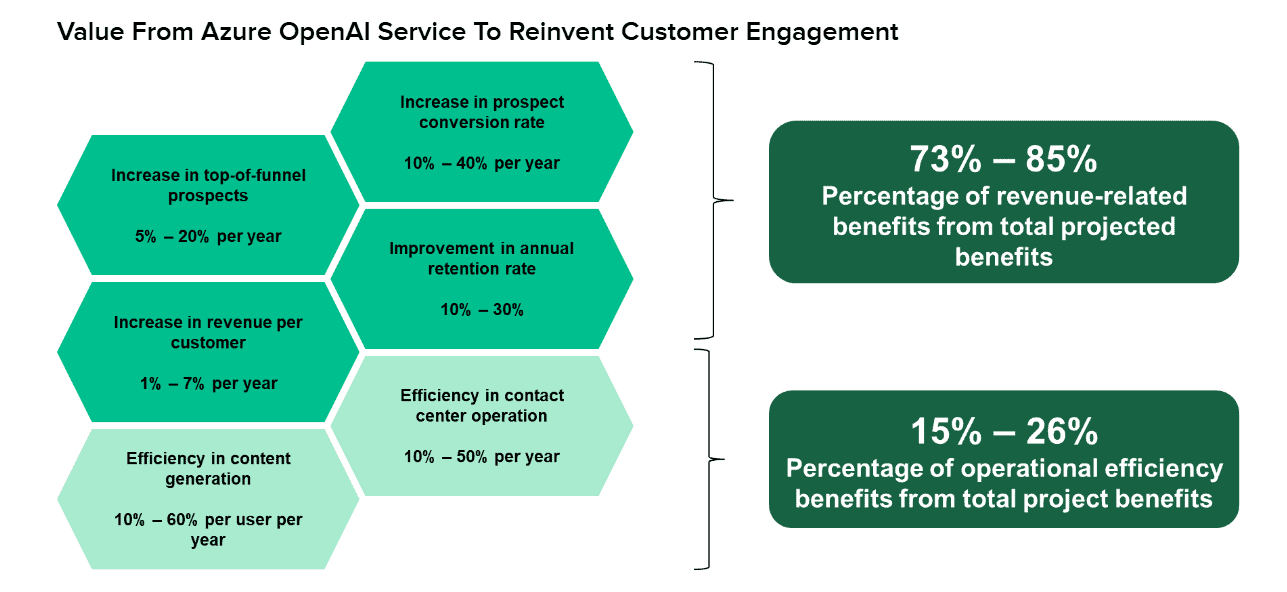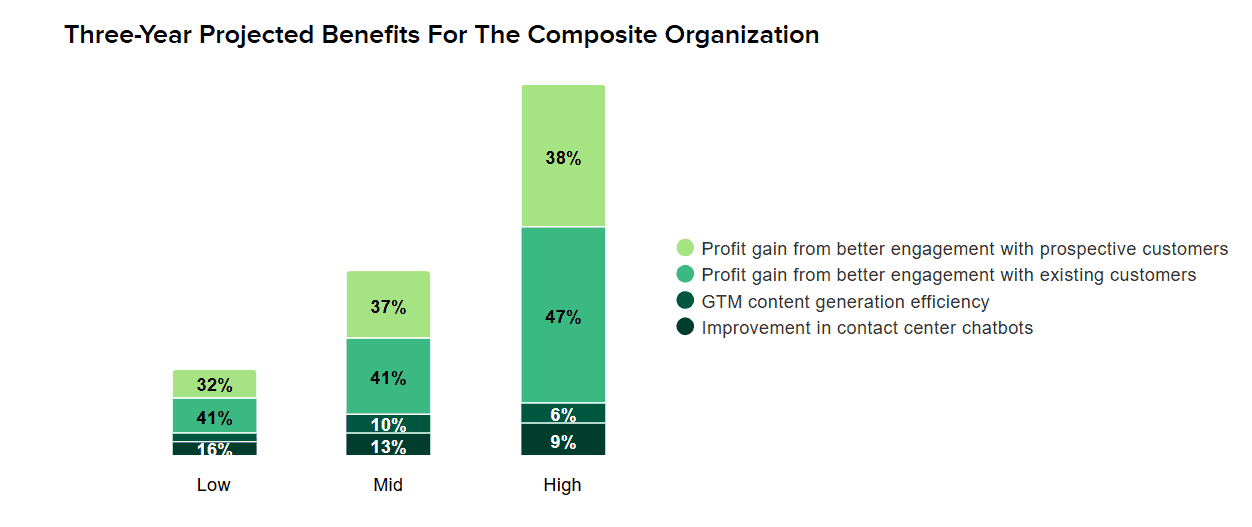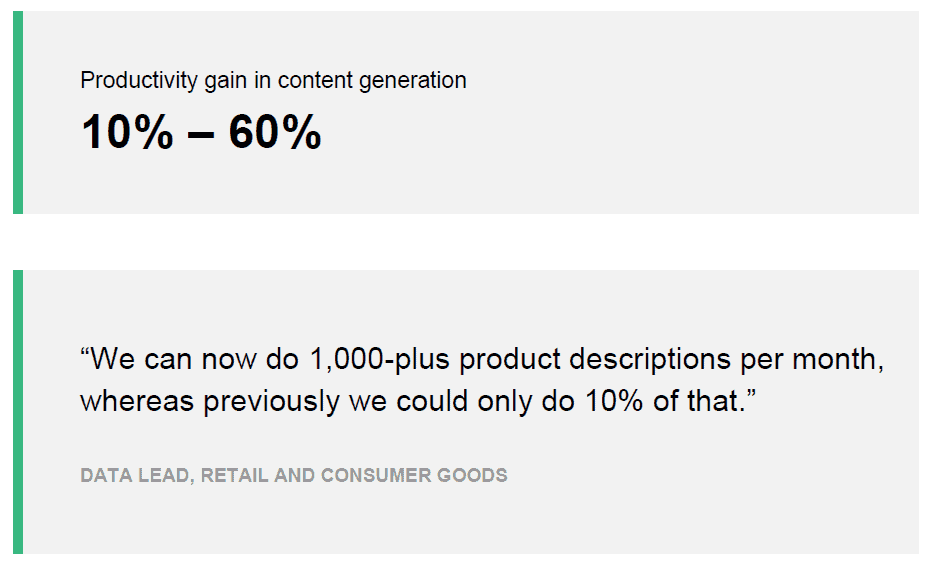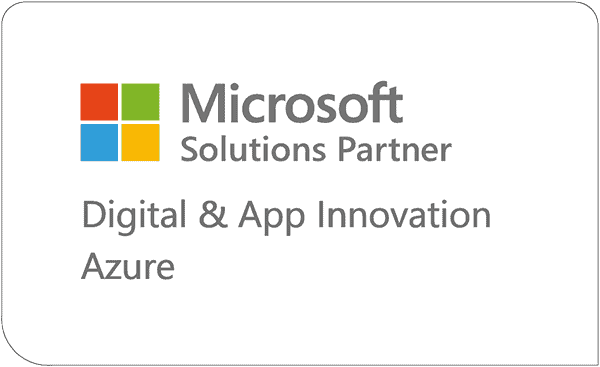Exploring the Total Economic Impact of Microsoft Azure OpenAI Service
Below are Smartbridge’s key takeaways from Microsoft and Forrester’s Total Economic Impact study on Azure OpenAI Service. Uncover the projected financial and business benefits of implementing Azure OpenAI Service.
The recent Forrester Total Economic Impact (TEI) study, commissioned by Microsoft, provides an insightful analysis of the projected financial benefits and potential transformations enabled by the Microsoft Azure OpenAI Service. Through this report, Forrester illustrates the Azure OpenAI Service‘s potential to drive business growth, improve customer engagement, and increase operational efficiencies across various industries, highlighting the service’s benefits for both commercial and public sector organizations.
For this study, Forrester interviewed 20 representatives across 16 organizations to create a composite organization which they used to create a model that projected the financial benefits of using Azure OpenAI.
Key Findings from the Study
Boost in Customer Engagement and Retention
The report emphasizes the Azure OpenAI Service’s ability to help organizations craft highly personalized customer interactions, enhancing engagement and satisfaction levels. This engagement boost is projected to yield up to an 8% revenue increase from existing customers over 3 years.
In our experience, this type of personalized approach is often essential, as it not only improves customer retention but also opens opportunities for cross-selling and upselling. The ability to fine-tune content for specific audiences drives higher customer loyalty, helping brands remain competitive in saturated markets.

Image courtesy of Forrester
Enhanced Efficiency in Contact Centers
A standout benefit of Azure OpenAI is its integration with AI-enabled chatbots, which are capable of handling simpler customer queries. This automation is projected to reduce the need for human agents by up to 50%. Such improvements in contact center efficiency translate into cost savings and improved response times.
From a consulting perspective, this is a significant gain, particularly for large enterprises with high volumes of customer interactions. When human agents are freed from repetitive tasks, they can focus on resolving more complex issues, improving the overall customer experience and building stronger customer relationships.

Image courtesy of Forrester
Productivity Gains in Content Creation
Azure OpenAI’s capabilities in generating and personalizing content represent a major shift in how organizations approach content-heavy tasks. Forrester notes that content generation productivity can improve by up to 60% per full-time employee, making it easier for teams to maintain consistency and scale content output. This is particularly valuable in marketing, where timely, relevant, and high-quality content is crucial. The ability to repurpose content efficiently across multiple languages and formats also opens doors for global market expansion, especially for companies looking to enter new regions.

Image courtesy of Forrester
Improvement in Lead Conversion
The report shows that Azure OpenAI can drive better engagement with prospective customers by personalizing content at different stages of the sales funnel. In practical terms, this could mean higher conversion rates and a 20% increase in top-of-funnel growth. By tailoring messaging to the needs of different buyer personas, companies can increase the chances of moving prospects through the sales funnel more effectively. In a consulting context, the ability to adapt AI-driven insights for sales strategy could significantly impact a company’s bottom line, especially in industries where lead conversion is challenging.
Public Sector and Educational Benefits
For non-commercial organizations, Azure OpenAI offers unique advantages. For example, public sector entities and educational institutions benefit from more accessible service delivery, higher engagement with constituents, and efficiency in content creation for public-facing information. This shift helps these organizations engage previously hard-to-reach populations, enhancing public awareness and expanding service accessibility.
Strategic Insights and Implications
From a consultancy viewpoint, the Azure OpenAI Service delivers far-reaching impacts across business functions, from operational efficiency to customer experience. However, it’s essential to recognize that successful adoption will rely on effective AI governance, high-quality data, and comprehensive change management. By addressing these factors, organizations can better harness the full potential of Azure OpenAI, positioning themselves to drive continuous innovation and maintain a competitive edge.
For companies aiming to build future-ready, AI-driven ecosystems, investing in generative AI services like Azure OpenAI is increasingly becoming not just an advantage but a necessity. Organizations that proactively integrate these tools and manage adoption challenges are likely to see greater financial returns and long-term value.
If you want to be a part of our Azure OpenAI success stories, reach out for a 30 minute no obligation call with one of our experts, and skip sales!
Keep Reading: Understanding Microsoft’s Azure OpenAI Service
Looking for more on AI?
Explore more insights and expertise at smartbridge.com/ai
There’s more to explore at Smartbridge.com!
Sign up to be notified when we publish articles, news, videos and more!
Other ways to
follow us:




